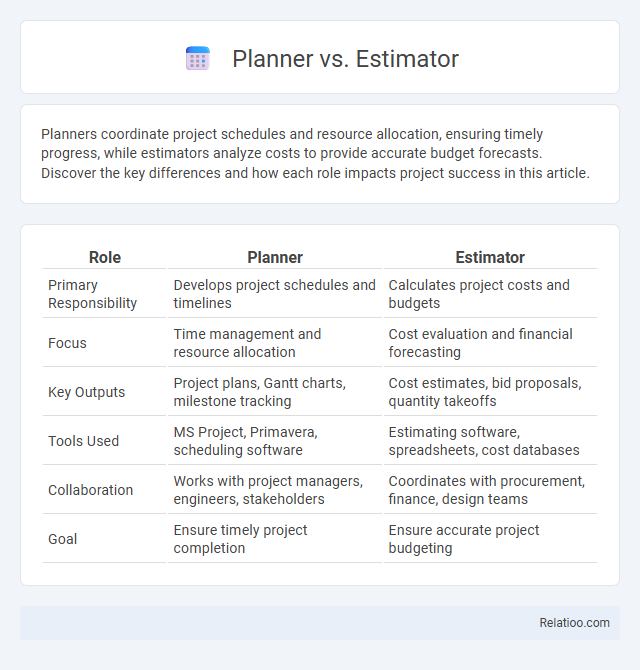Planners coordinate project schedules and resource allocation, ensuring timely progress, while estimators analyze costs to provide accurate budget forecasts. Discover the key differences and how each role impacts project success in this article.
Table of Comparison
| Role | Planner | Estimator |
|---|---|---|
| Primary Responsibility | Develops project schedules and timelines | Calculates project costs and budgets |
| Focus | Time management and resource allocation | Cost evaluation and financial forecasting |
| Key Outputs | Project plans, Gantt charts, milestone tracking | Cost estimates, bid proposals, quantity takeoffs |
| Tools Used | MS Project, Primavera, scheduling software | Estimating software, spreadsheets, cost databases |
| Collaboration | Works with project managers, engineers, stakeholders | Coordinates with procurement, finance, design teams |
| Goal | Ensure timely project completion | Ensure accurate project budgeting |
Understanding the Roles: Planner vs Estimator
Planners develop project timelines, allocate resources, and coordinate tasks to ensure smooth workflow and timely completion. Estimators analyze project requirements and calculate accurate costs, including materials, labor, and overhead, to provide budget forecasts. Understanding the roles of planner vs estimator highlights that planners focus on scheduling and execution, while estimators specialize in cost prediction and financial planning for projects.
Key Responsibilities of a Planner
A Planner is responsible for developing detailed project schedules, coordinating resources, and monitoring progress to ensure timely completion. They analyze project timelines, identify potential risks, and implement mitigation strategies to maintain workflow efficiency. Unlike Estimators who focus on cost calculations and quantity takeoffs, Planners concentrate on optimizing project sequencing and deadline management.
Core Duties of an Estimator
Estimators play a critical role by accurately calculating project costs through detailed analysis of materials, labor, and equipment requirements, ensuring budget adherence and financial feasibility. They collaborate closely with planners to integrate cost projections into overall project schedules, optimizing resource allocation and timeline efficiency. Precise estimations by the estimator help mitigate risks and support strategic decision-making throughout the project lifecycle.
Required Skills for Planners and Estimators
Planners need strong organizational skills, proficiency in project management software, and the ability to analyze schedules and resources effectively to ensure timely project completion. Estimators require excellent numerical aptitude, attention to detail, and expertise in cost analysis and market pricing to provide accurate project budgets. Your success hinges on developing these specialized skills tailored to each role's demands within construction and project management.
Tools and Technologies Used by Each Role
Planners utilize project management software like Microsoft Project and Primavera P6 to develop schedules and allocate resources efficiently, integrating BIM tools for spatial visualization. Estimators rely on cost estimation software such as RSMeans, CostX, and Sage Estimating to produce detailed quantity takeoffs and pricing analyses, often leveraging databases for up-to-date material and labor costs. Planners focus on timeline optimization and resource allocation, while estimators emphasize accurate cost predictions, each using specialized tools to support their specific analytical functions within construction projects.
Workflow Differences: Planning vs Estimating
Workflow differences between a Planner and an Estimator primarily revolve around task focus and timing. Your Planner develops comprehensive schedules and resource allocations based on project scopes, ensuring smooth progress and deadline adherence, while an Estimator calculates costs, materials, and labor requirements before project initiation to provide accurate budget forecasts. The Planner's workflow is ongoing and adaptive during project execution, whereas the Estimator's process is concentrated on pre-project financial analysis and risk assessment.
Collaboration and Communication in Projects
Effective collaboration and communication in projects hinge on the distinct roles of a Planner, Estimator, and Scheduler, each contributing specialized expertise to ensure seamless project execution. Your project benefits from Planners who strategize timelines and workflows, Estimators who deliver accurate cost assessments, and Schedulers who coordinate tasks and resources to keep the project on track. Integrating their efforts through clear communication channels fosters transparency, mitigates risks, and drives successful project outcomes.
Impact on Project Budget and Timeline
Project planners establish the overall schedule and resource allocation, while estimators focus on forecasting costs, directly influencing the accuracy of your project budget. A precise estimator reduces the risk of budget overruns by providing detailed cost projections, whereas an effective planner ensures timelines are realistic, preventing delays that can inflate expenses. Integrating both functions enhances control over project finances and deadlines, maximizing efficiency and minimizing financial risks.
Career Paths: Planner vs Estimator
Career paths for Planners often lead to roles in project management, scheduling, and resource allocation, where strategic oversight and timeline optimization are critical. Estimators typically progress towards cost management, budgeting, and financial analysis positions, emphasizing detailed quantity takeoffs, price evaluation, and risk assessment. Both roles require strong analytical skills, but Planners focus more on project execution timing while Estimators concentrate on accurate cost prediction and control.
Choosing the Right Role for Your Project
Choosing the right role for your project depends on understanding the distinct functions of a Planner, Estimator, and Scheduler. A Planner outlines the project roadmap and resource allocation, ensuring strategic foresight, while an Estimator calculates accurate cost projections based on detailed analysis of materials and labor. Your project's success hinges on selecting the role that aligns closely with your current phase--cost estimation for budgeting, planning for long-term execution, and scheduling for timeline management.

Infographic: Planner vs Estimator
 relatioo.com
relatioo.com